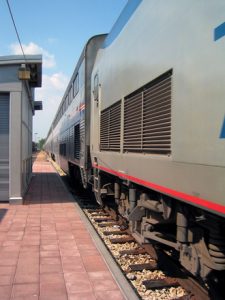 A lawsuit that would make most people shutter has entered the courts. The man at the center of the case will not be in attendance. He was an Amtrak employee at the time of a serious train crash in Pennsylvania. The 61-year-old was one of two people killed in the accident, and now the surviving loved ones are suing for damages, to cover the cost of the losses suffered and to account for their pain and suffering is the tragedy of a wrongful death.
A lawsuit that would make most people shutter has entered the courts. The man at the center of the case will not be in attendance. He was an Amtrak employee at the time of a serious train crash in Pennsylvania. The 61-year-old was one of two people killed in the accident, and now the surviving loved ones are suing for damages, to cover the cost of the losses suffered and to account for their pain and suffering is the tragedy of a wrongful death.
The man at the center of the lawsuit was not unaccustomed to working on the tracks. He had been employed by the company for more than 40 years. Along with his fellow co-workers, he was told to go address an issue on a stretch of tracks. According to the reports, that portion of the tracks was supposed to be closed. Unfortunately, that did not end up being the case. A fast-moving train came upon them before they had time to react.
The family has filed a lawsuit against Amtrak for failure to execute proper safety procedures to protect the lives of the workers.
This is not the first lawsuit of its type. Wrongful death lawsuits are not uncommon and are filed right here in St. Petersburg, but families and loved ones are often shocked to find out that winning the case doesn’t necessarily mean that they will receive the monetary reward. Just because the deceased left behind a Will and Testament does not guarantee that the monies will be received by those named as beneficiaries.
In most cases, the proceeds that result from a wrongful death claim will not be distributed based on the Last Will and Testament. The laws are slightly different when it comes to this type of case.
A child of the deceased, for instance, not listed in a will, would still likely receive a portion (if not all) of the proceeds. The determination is up to the discretion of the courts. In general, those who may expect to receive damages related to the wrongful death of a loved are that person’s children, spouse, and parents. These rights may be extended to sisters, brothers, and other blood relatives. The courts attempt to pay each beneficiary the amount that would be lost in support as a result of the person’s death. For the spouse and children, there may be additional sums paid for loss of companionship, protection, instruction, and guidance. Additional sums may also be allotted for mental pain and suffering.
Florida’s Wrongful Death statute allows five categories of people to possibly recover compensation when suffering from the death of a loved one. The damage inflicted on these people is termed “mental pain and suffering.” Those with the ability to ask for and receive compensation include: 1) parents of a deceased child if no other survivor exists; 2) minor children; 3) a surviving spouse; 4) when an adult child dies with no other living survivors, the parents may make a claim; and 5) potentially each parent of a minor child that it has been determined has died wrongly.
There are a lot of other details I won’t go into here, such as the dates from and to each recovery is based on, and medical or funeral expenses, but, in general, most of the recovery is determined at the discretion of the court. The amounts to be paid to each survivor and to the estate will be listed separately along with the final verdict. There is no guarantee, until that point, what amount shall be paid to each, and verdicts swing dramatically making it nearly impossible to predict. The best guidance that experienced attorneys can give comes from past verdicts.
When considering a wrongful death claim or lawsuit in the courts in or around Saint Petersburg, Florida, be sure that you speak, at length, with your personal injury attorney about the facts of the case, as well as about what would take place if the case was won. You don’t want any other unexpected surprises.
